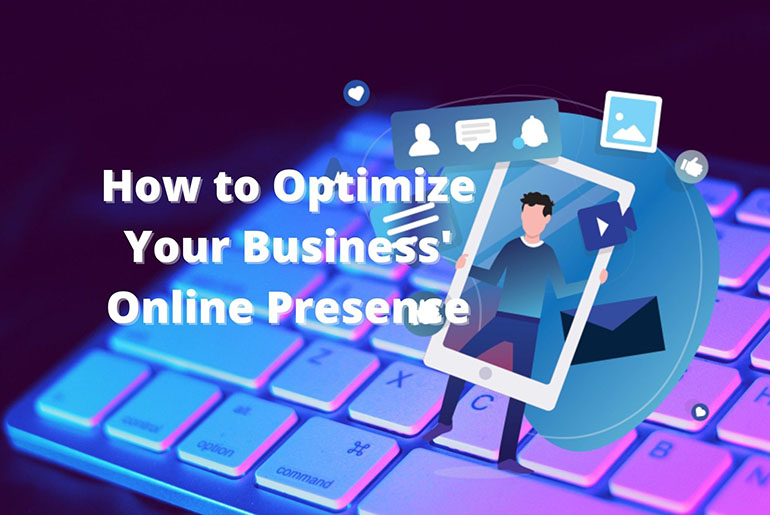Updated July 13th, 2022
Table of Contents
5 Effective Ways to Improve Your Business’s Online
Whether your business is a small home-based business or a sizeable nationwide company, effective use of online marketing will be an essential part of your ongoing advertising strategy. As such, optimizing your online presence is a crucial exercise to ensure your business reaches and retains its whole potential customer base.
There are several things you can do to be sure your business or product is meeting its full marketing potential.
First Impressions Matter
In the same way, the first impression you form when meeting a new person leaves a lasting impression; the online presence of a business begins with a professionally presented website. If your site is slow, clunky, and hard to navigate, it won’t matter how good the service or product you offer is. Customers will quickly get fed up and look elsewhere for a more user-friendly experience.
Your website also needs to provide all the relevant information in an easy to read and navigate manner as again, if a potential customer struggles to find the essential information they are looking for, they’ll go elsewhere.
So, keep your homepage sleek and pleasant so that visitors to it won’t just appreciate it visually but functionally as well, with the essential information out front and easily understood, and use links to further pages laid out concisely.
Improve Your Rankings
Besides the look and functionality of your website, how it interacts with the rest of the internet will play a big part in optimizing your online presence, such as using SEO articles to bring your business name higher up in search engine results pages.
When using SEO, it is vital to make sure that you do not have things like orphan pages that are not internally linked to other pages on your site. Search engine crawlers will not see these pages, nor can customers reach them without knowing and manually typing in the direct URL, making them redundant.
Running an analysis of your website will help you determine whether there are any such pages on your website and if you find there are, allow you to rectify them, thus improving your pages rankings in search results.
Access Across All Devices
Don’t forget that not all people accessing the internet are doing so from a PC or laptop, but that actually, more people are using smartphones and other mobile devices for most of their digital activity. This is important to remember because a website that is only programmed to load well on a PC will not work well on a mobile device and, therefore, will be limited in the potential customer base that will visit it.
So, when you are still at the design stage, make sure to have your website optimized for a variety of different device types, thus allowing more customers to visit your site comfortably.
Maximise Social Media Usage
Social media platforms have exploded over the last 15 or so years, and let’s face it, they aren’t going away anytime soon. It makes sense to use them to your company’s advantage, whether it be tapping into a new audience or finding a new way to continue to connect with your existing customer base.
Marketing on social media has the bonus of allowing you to interact immediately with other uses, so if you keep on the ball with managing your social media accounts, you can quickly form a good working relationship with your target audience and other relevant businesses.
For example, more people find the convenience of writing a short message on Twitter preferable to spending a long time trying to get through on the telephone when they want to make a complaint because, let’s face it when you are making a complaint, you are already not in the best mood, and 30 mins of hold music is not going to help this.
Because Twitter is out in the public domain, it is in the company’s best interest to attend to complaints made on this platform in a timely and customer-focused manner.
Users also love a company with a good personality on it. By fostering your company’s Twitter reputation, people will retweet positive interactions and thus spread your name, plus potential customers will pick up on how you deal with customer service.
That said, you don’t need to be on all social media platforms. Instead, choose two or three based on what your target audience uses most and build a solid following on them, rather than trying to tackle too many and ending up with weak user interaction.
A small start-up business may find Instagram and Facebook to allow them to engage best with their client base as they can also provide selling pages when a dedicated website isn’t warranted. In contrast, a larger company with a physical and online shop would benefit from a different social media profile.
Appreciate Your Current Customers
With the reality that few services are only ever truly needed once, working on your customer retention should not be overlooked when thinking about your business’s online presence. A business that builds and maintains a loyal following will have its name mentioned much more often than one that isn’t very well known or has a poor reputation.
As well as your basic good customer service, it is relatively simple to make your customers feel appreciated and desiring to spend their money with you again (or pass on your name to others), such as offering exclusive previews or discounts to those who have signed up to your mailing list or offering loyalty points that accrue every time a customer makes a purchase while logged into their account.
It goes to show that with a few sensible and well-aimed tweaks, you can take your digital presence up a notch to benefit your business by making it more accessible to a larger yet well-targeted audience who will become a loyal customer base in the future for you. This, in turn, equates to better profit margins and a reputation for good service and innovative marketing strategies, just the sort of company customers like to take their business to.












